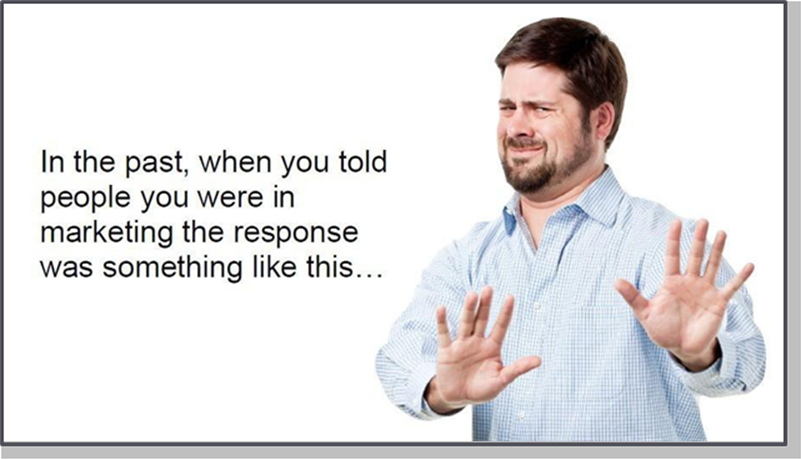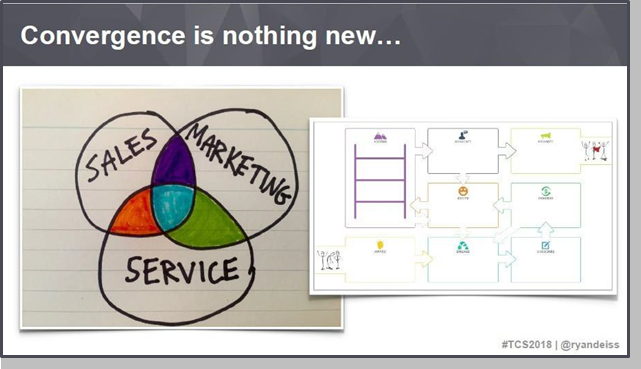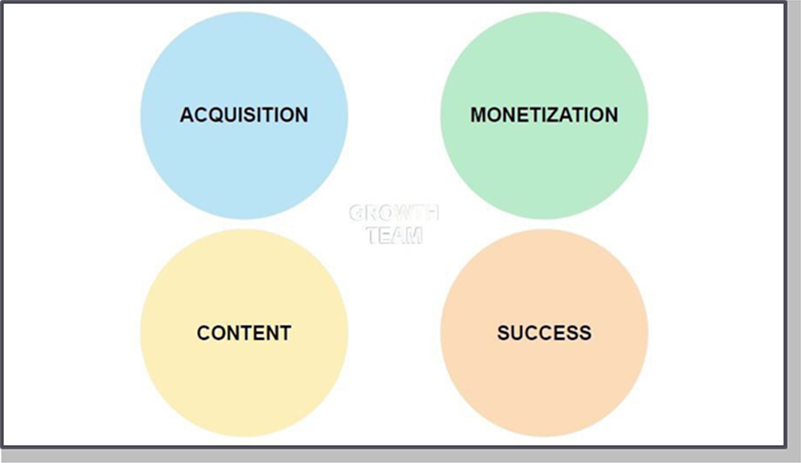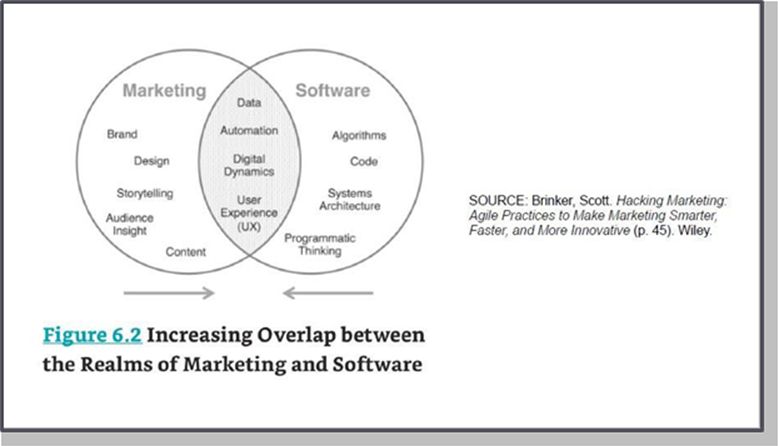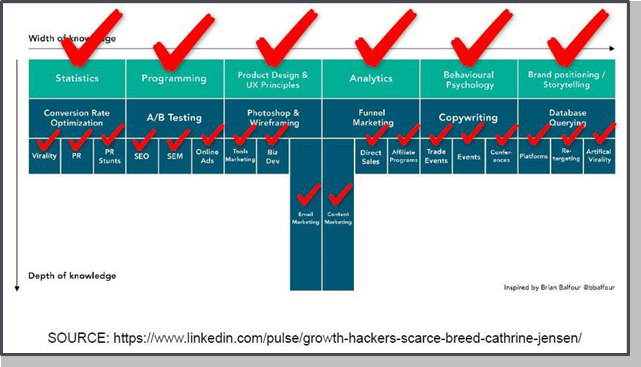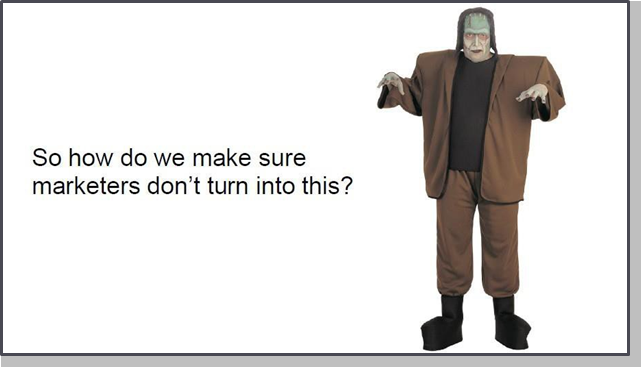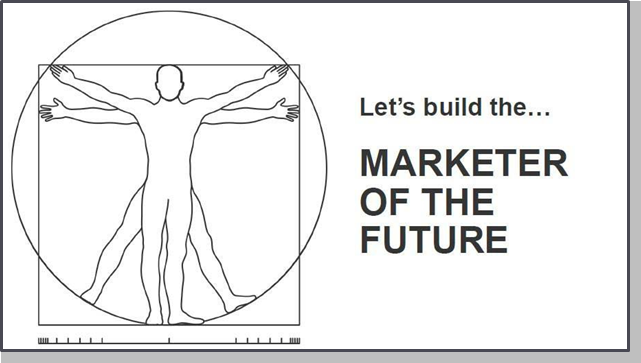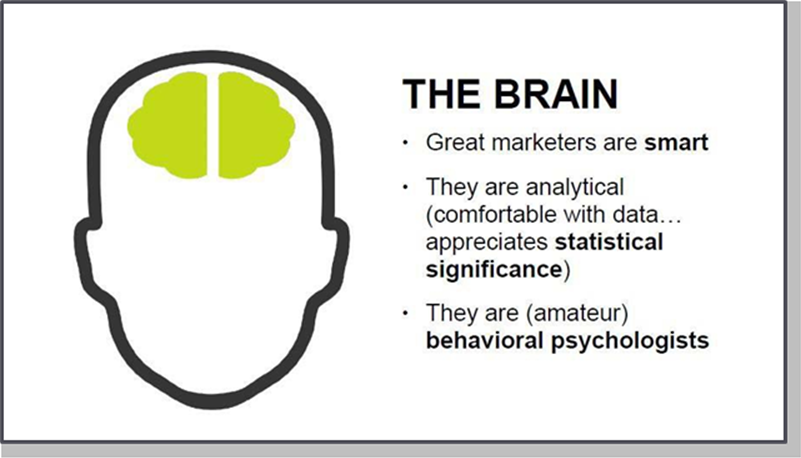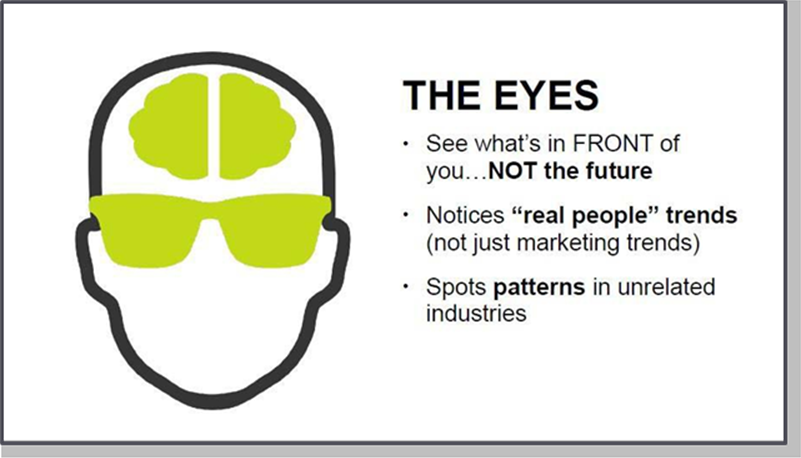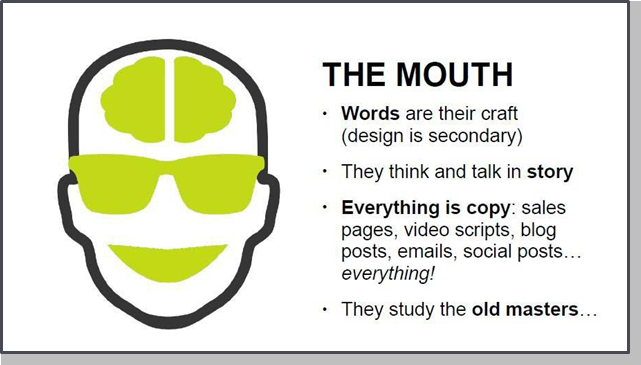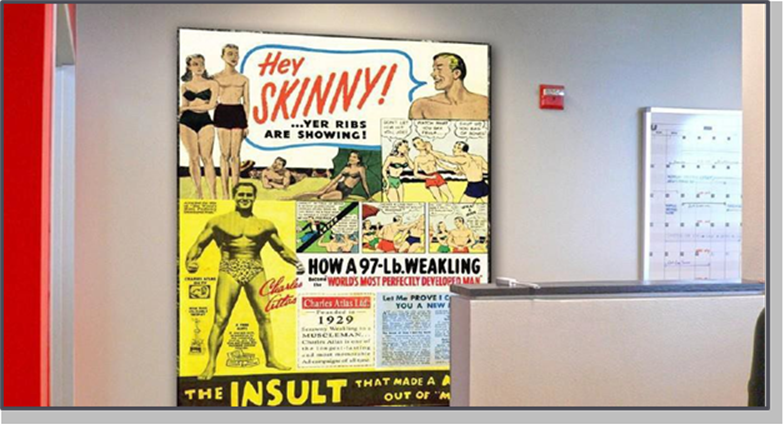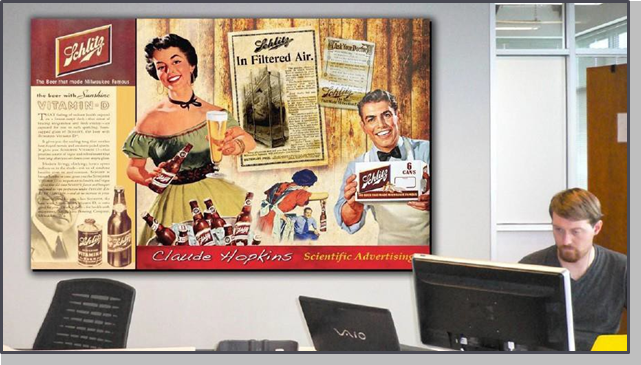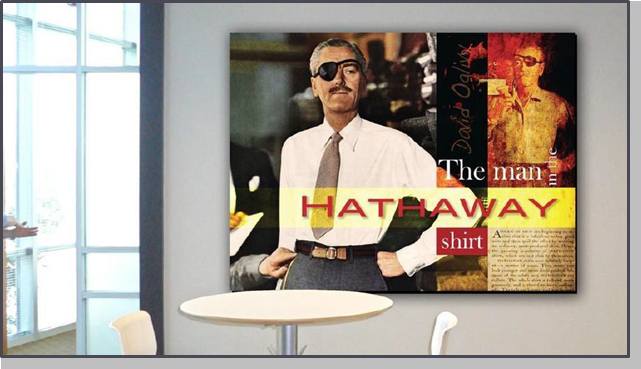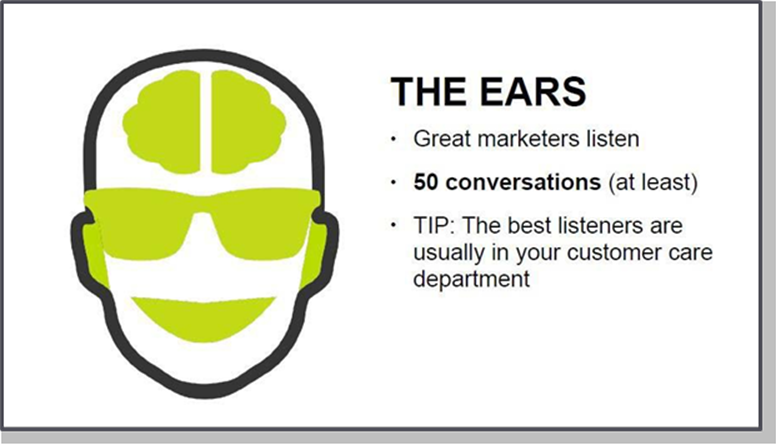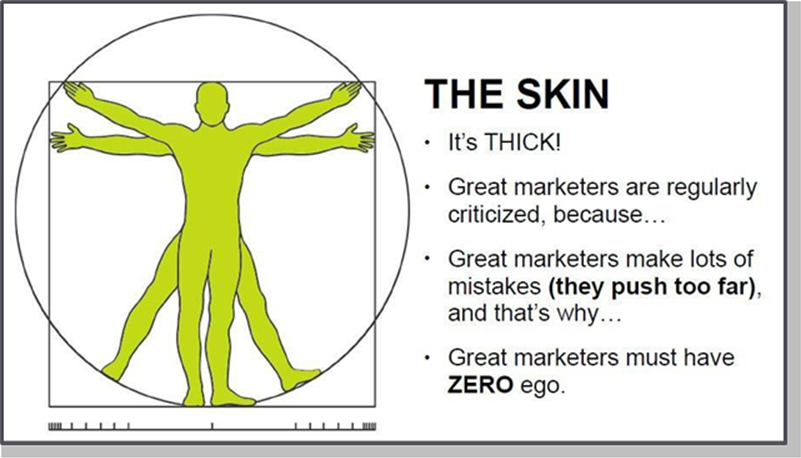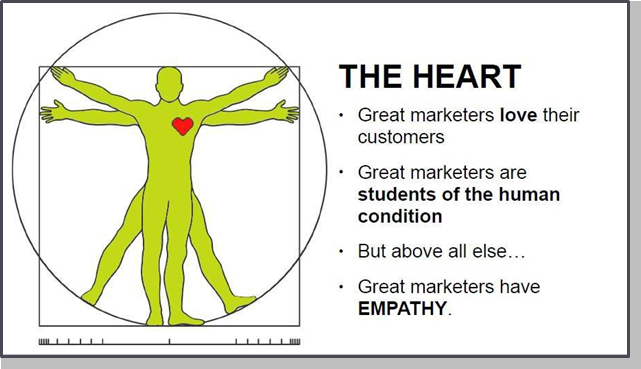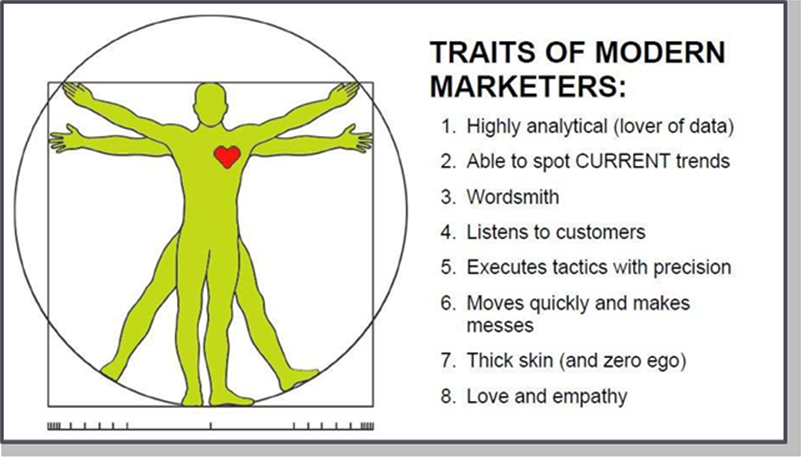Ryan Deiss
Ryan Deiss is the Founder and CEO of DigitalMarketer. Over the last 36 months Ryan and his team have invested over $15,000,000 on marketing tests, generated tens of millions of unique visitors, sent well over a BILLION emails, and run approximately 3,000 split and multi-variant tests. Ryan is also a highly sought after speaker and consultant whose work has impacted over 200,000 businesses in 68 different countries.
Today, what I want to talk about is the future for marketers, because it’s changing a lot. More specifically, what does the marketer of the future need to look like? What does the marketer of the future need to become?
I believe that what marketers were, what we as marketers and as marketing professionals used to be has fundamentally changed. And what’s cool is there’s something strange happening – a cool phenomenon that’s happening in marketing today.
In the past, when you’ve told people that you’re in marketing, I don’t know if anybody else has experienced this, the response was kinda like “gross.” All right? Gross. Especially if you were doing something in digital marketing.
Right, like, “Are you a spammer?” I remember when I first got started, the best in the world that I ever got was, “Oh, so I guess you sell stuff on eBay.” That was the best.
Everything else, if you were doing anything in the realm of online marketing/ digital marketing, it was like, “That’s super strange,” or people were like, “I don’t really like that,” or worse they’d say things like, “You’re the one that’s sending all those emails.”
But now, what’s really cool about this, it’s more like, “Mmm!” I don’t know what has happened, but in the last couple years the nerds and the social pariahs have kind of become the cool kids – the ones everybody wants to hang out with. It all comes down to marketing. We are the ones for better or worse, who are driving the ship, right?
Support for this trend is coming from some top names in the industry. For example, David Cancel, founder of several software companies including Drift, works in the SAAS space and is making his engineers “hang out” with marketers. Businessman, investor, author, and motivational speaker, Daymond John, is another a proponent of different member of teams working with the marketers.
So, what’s causing this phenomenon? What has caused this change to occur?
Convergence within Marketing
I believe that there’s one word that’s really driving all of this, and that one word is convergence, or more specifically, convergence in marketing. And this is really nothing new. This idea of convergence, it’s been around for a while.
People have been predicting this and talking a lot about how sales, marketing and service are all converging together. It’s part of the reason we created the value journey. The value journey is an acknowledgment that marketers who are doing their job properly are not just there to generate brand awareness, engagement or leads.
Good marketers own the entirety of the customer journey – from initial awareness, all the way to the end until they’re an active promoter, generating additional awareness for you.
This is not a new concept, but people are becoming more aware of how sales, marketing and service are combined and work together. The narrow focus used to think of marketing as a solo entity, partly because of the negative stigma and baggage around the word. But that’s changing, as more people realize that marketing is a broad concept, with many facets.
When most people think about marketing, what they really are talking about is acquisition. The same is true with the word sales. Many people think of sales people with a negative viewpoint, as in “They are just out to make money off of me.” Make no mistake, we are all selling and there is a goal to make money, but not at the expense of the customer journey.
As salespeople and marketers, we need to be proud of what we do because nothing happens until something gets sold. But perhaps a better word to use, and view to have is one of Monetization – a process that goes beyond simply “closing the sale” and moving on to the next customer.
Monetization looks at the entire process – from product development, to creating marketing content, to customer acquisition and all the way through customer success.
Customer Success Is Essential for Generating Brand Ambassadors
Customer success is more than just customer support or customer care. It’s about the people at your company, and this includes the marketers and the sales team, doing everything in their power to make sure that the people who purchase and consume your products are successful. To take someone from being a buyer to becoming a promotor and ambassador for your brand, they need to be happy with not just the product, but the entire process. And this starts from the moment you start marketing to them.
Thankfully, this convergence between Acquisition, Monetization, Content and Success is happening more and more.
Marketing needs to do more than simply generate awareness and a lead. We need to think more holistically, bringing together content, marketing, sales and customer success together. While these tasks may be handled by separate departments or teams within a company, they should not act as silos. They need to work together, with the same ultimate goal – to create happy, satisfied consumers who will promote your brand.
Perhaps a better way to view these departments is to view them as different positions on a single team that work together, each with a different role. For example, forwards and goalies on a soccer team don’t think, “Hey, I am on a different team,” but rather they work together as part of the same team. They pay attention to each other, and understand the other’s job in the process, acknowledging that they have different roles, but at the end of the day, everyone has the same goal – to win.
In the book Hacking Marketing, Scott Brinker, creator of the Martech 5000 landscape, discusses the convergence of software and marketing.
Think about it, just about everything is digital today, including marketing. Unless you still collect vinyl albums, what in your life today isn’t digital (other than books, magazines and other print materials, which area all available digitally)?
Marketers need to start getting good at product. The better you understand the product, the better you can be to promote it. In his 2013 article, “How to Become a Customer Acquisition Expert,” Brian Balfour discusses how marketing and software, marketing and product are coming together, so again, we see that this idea of convergence is not new.
Balfour also talks about the idea of a T-Shaped Marketer.
The T-Shaped Marketer
According the T-shaped marketer premise, marketers need to be good at a wide variety of things and specialize in one or two areas. The areas Balfour recommends that marketers be familiar with include:
- Statistics – Conversion Rate Optimization
- Programming – A/B Testing
- Product Design and UX Principles – Photoshop and Wire Framing
- Analytics – Funnel Marketing
- Behavioral Psychology – Copywriting
- Brand Positioning and Storytelling – Database Querying
This requires a breadth of knowledge that stretches far and wide, combined with an expertise, with deep knowledge in two areas of focus, depending upon their role within a team. For example:
- Russ Henneberry – expert with content, on the search side of things
- Ryan Deiss – area of expertise is creation and copywriting
- Richard Lindner – one of the best email marketers out there
- Dr. Robert Cialdini – specializes in behavioral psychology, with a focus on persuasive content
In this digital world, marketers need to know more than just “principles of traditional marketing.” Today, you need to know something about every little piece within marketing. This is broken down into eight critical core disciplines of digital marketing:
- Conversion Funnels
- Content Marketing
- Customer Acquisition
- Email Marketing
- Social Media
- Search Marketing
- Data and Analytics
- Testing and Optimization
Based upon your chosen area of specialization, and/or your role within a
team, there are certifications built around each of these disciplines.
Yet with the growing trend towards convergence, that’s not enough. Great marketers also need to know something about brand positioning, storytelling, sales, service, product design, as well as a bit of programming knowledge.
For some of you, this may seem a bit overwhelming, but if you understand the customer value journey, it should also be a bit exciting. You should be as excited as we want the consumer to be about the product or service you are marketing, right?
It’s important to understand that if people are not excited about the experience of your product or your service, then they’re not going to ascend. So yes, marketing must begin to own, or play a role in product. Whether that product is a physical one, whether that product is software, or whether that product is a service, marketing needs to inform that experience. Because that experience is right, smack dab, in the middle of the customer journey. You can’t divorce marketing from that.
So yeah, we must get good at product design. And then of course, don’t forget to throw in a bit of behavioral psychology. We all need to be like amateur psychologists. That should be fine. I’m sure we won’t screw that up. And then, let’s throw in technology and programming. Right?
But remember, this massive convergence of all these things in marketing and what is happening to marketers has had a positive impact. Marketers have gone from being the social pariah, the outcasts, to now being the girl everyone wants to bring to the dance. Everybody wants to hang out with marketers, because marketers sit at the center of all these other core disciplines.
The good news if you’re a marketer is that your future is well positioned. We can’t be avoided or ignored, because we are now involved in a bit of everyone’s business, with an understanding of how all these different components work together along the path to customer success.
But with this comes a bit of bad news – there are people are doing the hiring who expect marketers to be a “jack of all trades” and to know how to do EVERYTHING!
The Ultimate Combination – Full-Stack Marketers
There is a term, full-stack developer – one that can basically do it all. Similarly, there is a growing trend with people looking for full-stack marketers. You will hear people saying things such as: “I want a marketer who’s only good at everything. I need him to be able to do everything, or at least go kinda wide on everything.”
Before panic sets in, rest assured, you don’t have to know everything about everything, just enough to be able to work with and understand the role of the other members of your team. And within the different areas, you will choose your area of expertise, and become an expert in that.
When it comes to combining your chosen specializations, the combination should make sense. There’s something funny about combinations. While some combinations are good, others are not so good. Let’s look at some food analogies to drive this point home, okay?
Peanut butter and jelly, for example. Good combination. Ice cream and apple pie. Great combination. Avocado and pretty much anything. Great combination.
Meat Skittles. Oh my God, not a good combination. Here’s one I think you’ll love. Who loves spaghetti? Who loves tacos? How about a spaghetti taco? Ugh. Spaghetti’s good. Tacos are good. Let’s bring them together. Spaghetti taco. No? How about hot dog pizza?
With so much to learn, and so many pieces of the marketing pie, how do we make sure that marketers don’t turn in to “creations” with areas of expertise that simply don’t go together? How do we make sure that we don’t ask marketers to be Frankenstein? To Frankenstein together a role, so that it’s like, “I need you to do everything.”
But in all seriousness, what we need to figure out is what does the marketer of the future look like? How do we build the marketer of the future? How do we avoid becoming what clients want, a jack of all trades, without becoming a master of none? Or building a foundation of core specializations in areas that simply don’t go together?
The Brain of the Future Marketer
If we’re going to build the marketer of the future, we need to start at the top. Let’s start at those important bits floating around. The first thing is the brain. What does the brain of the marketer of the future need to look like? Well first, I hope it goes without saying, great marketers need to be smart. You need to have some degree of intellect, but I’m not really talking about IQ.
Really what marketers need to be is analytical. They need to be comfortable with data. They need to be comfortable with spreadsheets.
- If you’re a marketer, and you hate Excel, it’s going be hard. If you’re a marketer, and you’re afraid of data, don’t want the analytics, and don’t have an appreciation for statistical significance, you’re dangerous.
- If you’re the type of marketing who went, “Yep, we ran that test for a few hours and it’s looking good. Scale baby!” You’re dangerous.
- Marketers that don’t know the difference between correlation and causation are dangerous. You need to know this stuff.
But marketers, in addition to being analytical, also need to be amateur behavioral psychologists. Now I’m not asking you to get a couch and have people lay down. What I’m asking is that you become students of the human condition. That you understand how humans work.
It is important that marketers of the future know how to craft an offer that makes sense to humans, who generally don’t make sense. This has way more to do with psychology than the actual tactics of marketing.
So, what does the marketer of the future need to do if they want to develop this type of a brain? The first step is to educate yourself. Build your library with books such as:
- Lean Analytics by Alistair Croll and Benjamin Yoskovitz
- Fooled by Randomness by Nassim Nicholas Taleb
- Persuasion and Influence, both by Dr. Robert Cialdini
- Pre-Suasion: A Revolutionary Way to Influence and Persuade by Robert Cialdini
- Predictably Irrational by Dan Ariely
- Meet Your Happy Chemicals by Loretta Breuning
- Hooked: How to Build Habit-Forming Products by Nir Eyal
Another great recommendation for digital marketers is to get certifications in areas such as analysis and data, optimization in testing, and customer value optimization
The Eyes of the Future Marketer
All right, so we talked about the brain, now let’s move to the eyes. Marketers need to see what is in front of them. They don’t need to see the future. This is so important. It’s not about predicting the future. It’s about understanding what is happening now.
It’s easy to make predictions when you’re not predicting the future, and you’re just talking about what’s happening all around us. The danger of marketers is they don’t appreciate real people trends. We geek out on marketing trends.
We decide that Snapchat is the next big thing. We decide that, well obviously QR codes are going to change everything.
We decide this stuff, because we think it’s cool. Because it’s new, and it’s novel, and we get bored with email.
Email’s obviously going die, except for the fact that everyone you know uses it. And most of the people you know aren’t on Snapchat.
So, as a marketer, don’t worry about predicting the future. You don’t have to do that. The more you do that, the less relevant you’re going to be to your customers. Don’t predict the future, look around and see what real people are doing.
I like to say marketers need more redneck friends, okay? All right? Marketers, hang out with more rednecks. They’ll tell you, “Man, I don’t even know what that is.” Listen to that. Be like, “No, it’s the greatest thing in the world. You just don’t understand.”
The “everyday person” understands what matters to them. You’re the guide. They’re the hero. Don’t tell them where they need to go, figure out the journey they’re on and help them get there. See what’s around you today. You don’t have to predict the future.
You also need to begin to spot patterns in unrelated industries. It freaks me out when I see marketers who only ever read marketing blogs. Especially marketers who only ever read marketing blogs for marketers who only ever talk about marketing to marketers.
Go to business conferences that have nothing to do with marketing. See what’s working in the franchise space. It’s why I love War Room Mastermind so much. We get to hang out with people who don’t really know that much about marketing, they’re just business people. They know a lot about business. And we can apply different ideas that they have in to these markets.
So, we got the brain, we have the eyes, now we need the mouth.
The Mouth of the Future Marketer
First of all, you’ll notice that the mouth of the marketer is big. It’s because most marketers don’t shut up. But what I mean by the mouth is that words are a marketer’s craft. This is their tool.
Design is secondary. So many marketers believe that their job is to make sure that everything is pretty, that everything is on brand. Words. Words. I’m not saying that pictures don’t matter, but you figure out the words first, then you figure out the pictures that are going to reinforce those words.
The pictures should speak. They should be evocative. They should make someone think and feel something, and you should know that thing that they’re thinking and feeling. It should be the words that you want to implant in their brain. The pictures, the imagery, the video, it’s all there. Right?
So, it doesn’t matter if you’re creating video. It doesn’t matter if you’re writing an email. It’s all words.
Marketers also think and talk in story. In narrative. As human beings, we learn through story. Marketers need to get good at story telling. Again, everything is copy. I don’t care if it’s a sales page, that’s copy. If it’s a video script. If it’s a blog post, that’s copyrighting. If it’s a social post, everything is copy.
Everything is marketing because in everything, whether you’re trying to convince someone to buy something, you’re just trying to convince
somebody to read something that’s valuable or watch something that’s going to be meaningful to them, over all the other options they have on that day, you need to sell them on that action. They’re not going do it on their own.
Everything is copy.
Great marketers also study the old masters. Yes, when you are interviewing for a position, it’s important know about the leadership team in the company, but it’s more important to know about the masters in the field who have paved the way – people like John Caples and David Ogilvy. While there are new tactics and strategies being developed, when it comes right down to it, just about all of it is being applied to information that has been around for a while.
Show that you know about advertising and marketing pieces that paved the way.
John Caples, and his famous ad, they laughed when I sat down at the piano, but when I started to play…
How about the Charles Atlas ad. This ad ran successfully in comic books for decades. Anybody respond to this ad? Yeah. Yep. Hey skinny, your abs are showing. Your ribs are showing, not abs.
How about this one? The Schlitz Beer ad, by Claude Hopkins. Claude Hopkins took an unknown beer company and put them in the like number two in a brief period of time, because he began advertising the beer as cold filtered.
Guess what? All beer was cold filtered, there’s no other way to do it. But he
began talking about it.
Do you remember the pilot episode of Madmen? When Don Draper has this idea, “Well, cigarette companies can’t advertise that cigarettes are healthy anymore, what are we gonna do?” And he said, “Yeah, we don’t have to talk about how cigarettes are healthy, let’s talk about how our brand of cigarettes are toasted.”
It’s toasted, do you remember that? It’s toasted. That was his big thing. It was a straight knock-off of Claude Hopkins in this ad. Right? The producers and writers of Madmen knew about this. They put it in. They just shifted it from beer to cigarettes.
And then there’s the king, David Ogilvy. Any of you familiar with the man in the Hathaway shirt ad? Are you familiar with the Dos Equis Most Interesting Man Alive ads? These are a direct rip off of the man in the Hathaway
shirt. David Ogilvy was there decades before, nobody knew it. Nobody appreciated it. As soon as I saw that I was like, somebody’s read their Ogilvy.
So, have you read your Ogilvy? If not, get this book, Ogilvy on Advertising. You also need to get Scientific Advertising by Claude Hopkins. So many people say that you should read this book, but very few people who have actually read it. There’s gold inside this book!
Here are two more to add to your Marketer of the Future Library: Tested Advertising Methods by John Caples and Breakthrough Advertising by Eugene Schwartz.
You want to get good at copyrighting? Study radio; and there is no better resource than The Wizard of Ads by radio ad man Roy Williams. Digital today is way more akin to radio than direct mail. If you think about it, when you’re scrolling through Facebook, scrolling through, scrolling through, and then something catches your eye, that’s just like driving down a road and a commercial catches your ear. When you have to compact a very complex idea in to a 30 or 60 second spot, that’s hard. You give me 12 pages, that’s a piece
of cake. I need to convince this down to 30, 60? That’s hard. Study radio, people, and Roy’s one of the best.
Want to take it a step even further? Get a certification in direct response
copyrighting.
The Ears of the Future Marketer
Now we get to the ears. That’s because great marketers listen. Specifically,
great marketers listen to their customers.
Daymond John was asked this question, “What would you do if you were in your worst, worst, worst, worst possible state? What would you do?” His
response: “I’d wake up and I’d make 50 phone calls. And I’d call 10 of these people, 10 of these people, then 10 of these people.”
If you’re a marketer, and you’re unwilling to talk to your customers, and are unwilling to have conversations, then you are not doing your job right. It can be hard, especially if you are an introvert, but you need to do it. Great marketers listen. And to do that, you need to be willing to talk to people. Want to get better at it? Challenge yourself to have 50 conversations with new people!
By the way, the best listeners in your company are usually in your customer care department. Customer success departments, which is why I love promoting people from a customer care role in to marketing, are diamonds in the rough. They know your products, they know it well. They know your customers, and if you’re going to be good at that job, you must have empathy. You must have empathy. And empathy is the ultimate tool of a marketer. Sincere empathy.
The Body of the Future Marketer
So that’s the head. Now let’s go up to the body, starting with the hands.
If you noticed, this image of the marketer of the future has multiple hands, and they need them because there’s a lot of work to be done. Great marketers know the tactics, and they’re willing to get those hands dirty. They know the tactics and the tactical stuff. They try new things and they test new channels. Right? They try new things, they test new channels. And they are T shaped.
So great marketers understand what’s going on here, but they really go deep in too. I would never have a marketing manager, who all they did was talk about stuff. You’re going to specialize in something, you’re going to do it, and you’re going to do it better than anybody else, and that’s why you get to run the team. You stop doing, is the day you start really sucking. Okay?
Be T shaped. You have to be good at that stuff, and yeah, you need to have a general overview of the other things, including the eight critical core disciplines of digital marketing. Tactics are important, but if you haven’t developed the developed the brain, the eyes, the mouth, and the ears of a marketer, your “hands” will be useless in implementing the tactics.
Now let’s talk about the feet.
What do the feet of a marketer look like? Great marketers are fast. They move quickly. Great marketers are agile, now I don’t mean that from a literal physical perspective. I mean that from an actual agile marketing perspective.
Have heard the phrase minimum viable product? This idea of a minimum viable product is big in product. In marketing, we’ve got the minimum viable test. We have the minimum viable offer. This doesn’t have to be perfect, we just need to know enough to be able to test it.
And marketers of the future understand that perfect is the enemy of speed and money loves speed. They don’t try to make it perfect, they’re okay making a mess. The book mentioned before, Hacking Marketing, also gets into the idea of agile marketing tactics and how to set up an agile marketing team. Another great resource on how to build an agile marketing team within an organization is The Agile Marketer by Roland Smart.
Now we come to the skin.
The first thing you should know about the skin of the future marketer is that it’s thick. And the reason it’s thick is because great marketers are regularly criticized, because great marketers make lots of mistakes, and they push too far. And that’s why great marketers must have zero ego.
If you’re unwilling as a marketer to admit that you made a mistake, that a test that you were excited about didn’t work, you’d be a terrible marketer. You’re going to be a dangerous marketer, one who is going to be a disservice to your company and your customers. Yes, you want to strive to be great, and to have confidence, but you’re not allowed to have an ego.
Then finally, we have the heart.
Great marketers love their customers. We used to say jokingly, “Boy, business would be great if it weren’t for the customers.” Screw that. If that’s existing within your organization, even if somebody’s being sarcastic or humorous or whatever, get rid of it. Doesn’t exist.
You only live, you only have a reason to be, because of those customers. Love your customers. Genuinely, sincerely care about them. And as mentioned it before, great marketers are students of the human condition. Great marketers don’t just love their customers, they love humans in general.
But above all else, great marketers have empathy. Great marketers can feel what they’re customers are feeling and they can think about what they are going through. They can empathize, and they can sincerely want to solve a problem or fulfill a need for their customers.
The key to being a great marketer, and to having a great business, is simply, in many cases, caring a lot more than your competitor. If you care more, you will look for ways to add more value. If you look for ways to add more value, your average customer value will go up. You will be able and willing to spend more to acquire a customer, and you will win. That’s the key.
That’s always the rule in business. He or she who is able and willing to spend the most to acquire customer wins. But how do we get to the point that we’re able and willing to spend more to acquire a customer? We add more value, so we can ask for more value. How do we get to a point where we’re willing to add more value? We care more. It sounds cheesy, but it’s real.
Traits of Modern Marketers
Let’s review what we have covered so far about building the marketer of the future.
Modern marketers are highly analytical. They’re able to spot current trends, they’re wordsmiths. Modern marketers listen to their customer. They execute tactics with precision. They move quickly, and they make messes. They
have a thick skin and zero ego. And they possess an abundance of love and empathy.
So, the challenge is this – how do we become full-stack marketers? Great marketers, they aren’t born, they are made. What has been described in creating the perfect marketer, nobody comes out of the womb like that. You’ll have a few of the traits, but the rest of them need to be built.
If you have ever run a company, you may have found yourself saying, “I just can’t find good people.” I hear that all the time. We hear that all the time in war. “It’d be so good, but I just can’t find good people.” There’s good people everywhere, the problem is the person you’re looking for, doesn’t exist.
And the reason this has happened, is our economy has fundamentally shifted. We used to be in a credentials-based economy. The World Economic Forum has been doing a lot of work on this over the past couple of years. There has been a shift away from jobs being credentials based, meaning I go to school, I learn to do something, and then I get plugged in to an organization and they trust me to do it because I have a sheet of paper known as a diploma that says I can do it.
Now this is going to still be here for a lot of roles, but it’s not going be there for a whole lot more roles, and that’s because 65% of children entering primary school today will ultimately end up working in a completely new job that doesn’t yet exist.
How can our school systems prepare full-stack marketers, prepare for other roles, when those roles don’t even exist, and they don’t know that they exist? We believe that the companies who win will be the companies who bear the burden of educating and training their workforce. That’s it. Those are going to be the companies that win. Because the universities can’t. And the people don’t know how.
According to a study by the Pew Research Center, nearly half, 49%, of people in the job force today believe that employers should have a lot of responsibility in terms of ensuring workers have the right skills for the job. 89% believe that employers should bear at least some of the responsibility. That’s where we are today. And it isn’t just for entry level, the more educated someone is, the more people believe that their employer should bear the burden of their continuing education.
This applies across the board, for every role at your company. So, what’s the solution? What do we need to do? We need to combine best practices, meaning all the genius, all the brilliance that exists within the books and courses, need to be combined with the tribal knowledge that exists within your company.
- Hacking Marketing by Scott Brinker
- Lean Analytics by Alistair Croll and Benjamin Yoskovitz
- Fooled by Randomness by Nassim Nicholas Taleb
- Influence: The Psychology of Persuasion by Dr. Robert Cialdini
- Pre-Suasion: A Revolutionary Way to Influence and Persuade by Robert Cialdini
- Predictably Irrational by Dan Ariely
- Meet Your Happy Chemicals by Loretta Breuning
- Hooked: How to Build Habit- Forming Products by Nir Eyal
- Tested Advertising Methods by John Caples
- Ogilvy on Advertising by David Ogilvy
- Scientific Advertising by Claude Hopkins
- Breakthrough Advertising by Eugene Schwartz
- The Agile Marketer: Turning Customer Experience Into Your Competitive Advantage by Roland Smart
- www.digitalmarketer.com
- www.warroommastermind.com

